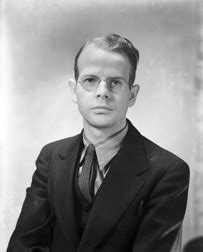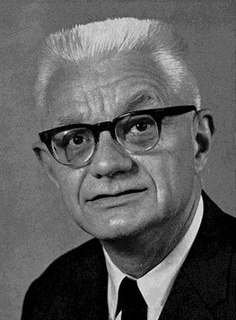A Quote by John Stuart Mill
The ends of scientific classification are best answered, when the objects are formed into groups respecting which a greater number of general propositions can be made, and those propositions more important, than could be made respecting any other groups into which the same things could be distributed. ... A classification thus formed is properly scientific or philosophical, and is commonly called a Natural, in contradistinction to a Technical or Artificial, classification or arrangement.
Quote Topics
Related Quotes
Extinction has only separated groups: it has by no means made them; for if every form which has ever lived on this earth were suddenly to reappear, though it would be quite impossible to give definitions by which each group could be distinguished from other groups, as all would blend together by steps as fine as those between the finest existing varieties, nevertheless a natural classification, or at least a natural arrangement, would be possible.
The classification of facts and the formation of absolute judgments upon the basis of this classification-judgments independent of the idiosyncrasies of the individual mind-essentially sum up the aim and method of modern science. The scientific man has above all things to strive at self-elimination in his judgments, to provide an argument which is as true for each individual mind as for his own.
The axioms of physics translate the laws of ethics. Thus, "the whole is greater than its part;" "reaction is equal to action;" "the smallest weight may be made to lift the greatest, the difference of weight being compensated by time;" and many the like propositions, which have an ethical as well as physical sense. These propositions have a much more extensive and universal sense when applied to human life, than when confined to technical use.
Paris is a city of centralisation--and centralisation and classification are closely allied. In the early times, when centralisation is becoming a fact, its forerunner is classification. All things which are similar or analogous become grouped together, and from the grouping of groups rises one whole or central point. We see radiating many long arms with innumerable tentaculae, and in the centre rises a gigantic head with a comprehensive brain and keen eyes to look on every side and ears sensitive to hear--and a voracious mouth to swallow.
Unfortunately, philosophers of science usually regard scientific realism and scientific anti-realism as monistic doctrines. The assumption is that there is one goal of all scientific inference - finding propositions that are true, or finding propositions that are predictively accurate. In fact, there are multiple goals. Sometimes realism is the right interpretation of a scientific problem, while at other times instrumentalism is.
I contend that the continued racial classification of Homo sapiens represents an outmoded approach to the general problem of differentiation within a species. In other words, I reject a racial classification of humans for the same reasons that I prefer not to divide into subspecies the prodigiously variable West Indian land snails that form the subject of my own research.
When you want to organize knowledge. you will be careful to base the classification upon essential qualities. You will thus derive classes in which the members have the greatest amount of resemblance to one another and the greatest amount of difference from the members of other classes. But suppose that, instead of organizing knowledge, you set out to organize ignorance and prejudice. You will then do precisely the opposite.You will keep the classification vague and flexible, so that it can be made to include just whatever individuals you choose.
In obedience to the feeling of reality, we shall insist that, in the analysis of propositions, nothing "unreal" is to be admitted. But, after all, if there is nothing unreal, how, it may be asked, could we admit anything unreal? The reply is that, in dealing with propositions, we are dealing in the first instance with symbols, and if we attribute significance to groups of symbols which have no significance, we shall fall into the error of admitting unrealities, in the only sense in which this is possible, namely, as objects described.
For more than 50 years, men and women around the world have reported sights in the sky that are strange to their experience and understanding. Inasmuch as many of these sights appeared to be solid objects having impressive performance, they have become known as Unidentified Flying Objects (UFOs) or, colloquially, flying saucers. Their positive identification is one of the major public scientific challenges of the era, with a significant number of these sights so far defying all reasonable efforts at classification.
What can be more foolish than to think that all this rare fabric of heaven and earth could come by chance, when all the skill of art is not able to make an oyster? To see rare effects, and no cause ; a motion, without a mover ; a circle, without a centre ; a time, without an eternity ; a second, without a first : these are things so against philosophy and natural reason, that he must be a beast in understanding who can believe in them. The thing formed, says that nothing formed it ; and that which is made is, while that which made it is not, This folly is infinite.
The propositions of mathematics have, therefore, the same unquestionable certainty which is typical of such propositions as "All bachelors are unmarried," but they also share the complete lack of empirical content which is associated with that certainty: The propositions of mathematics are devoid of all factual content; they convey no information whatever on any empirical subject matter.







































